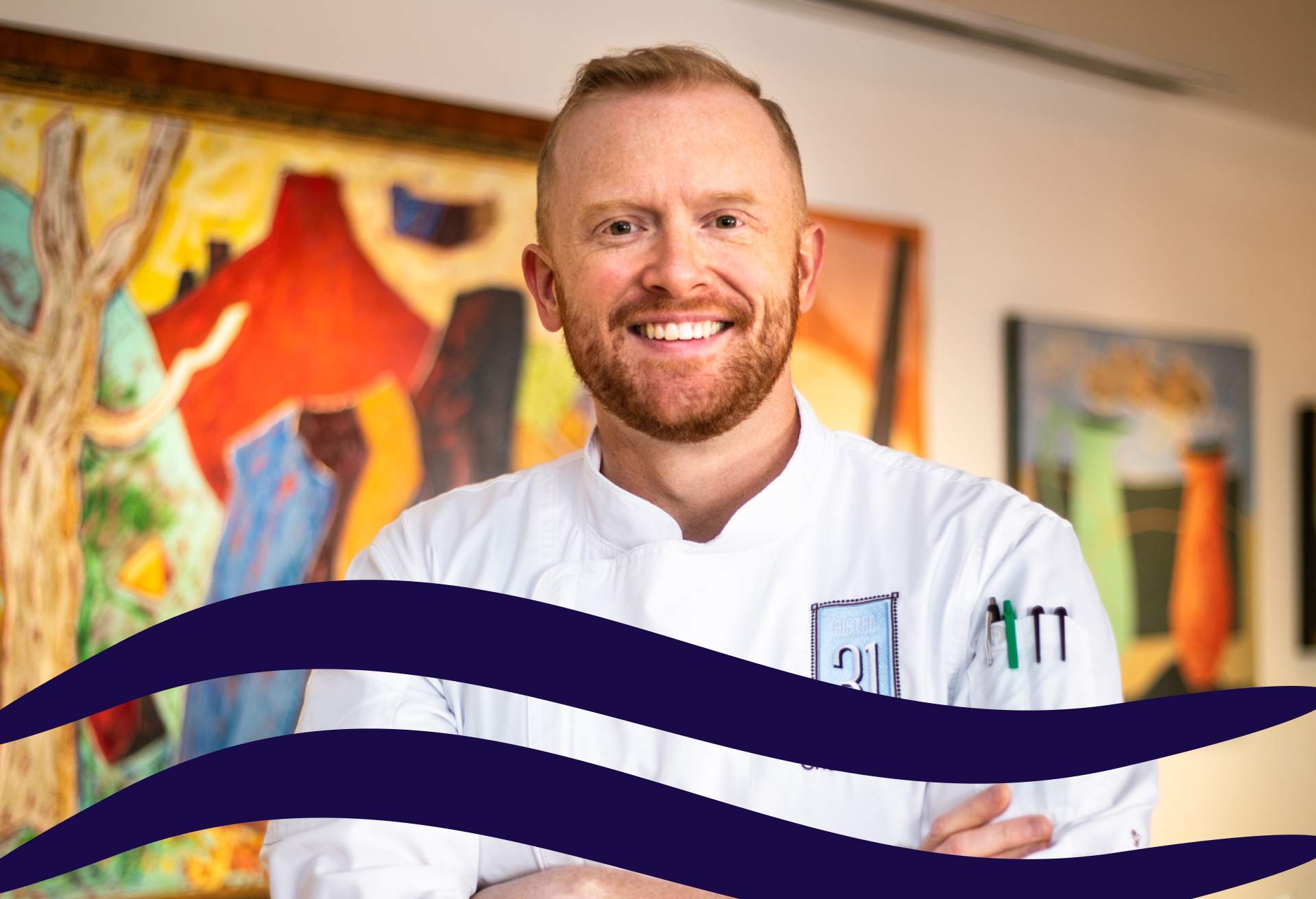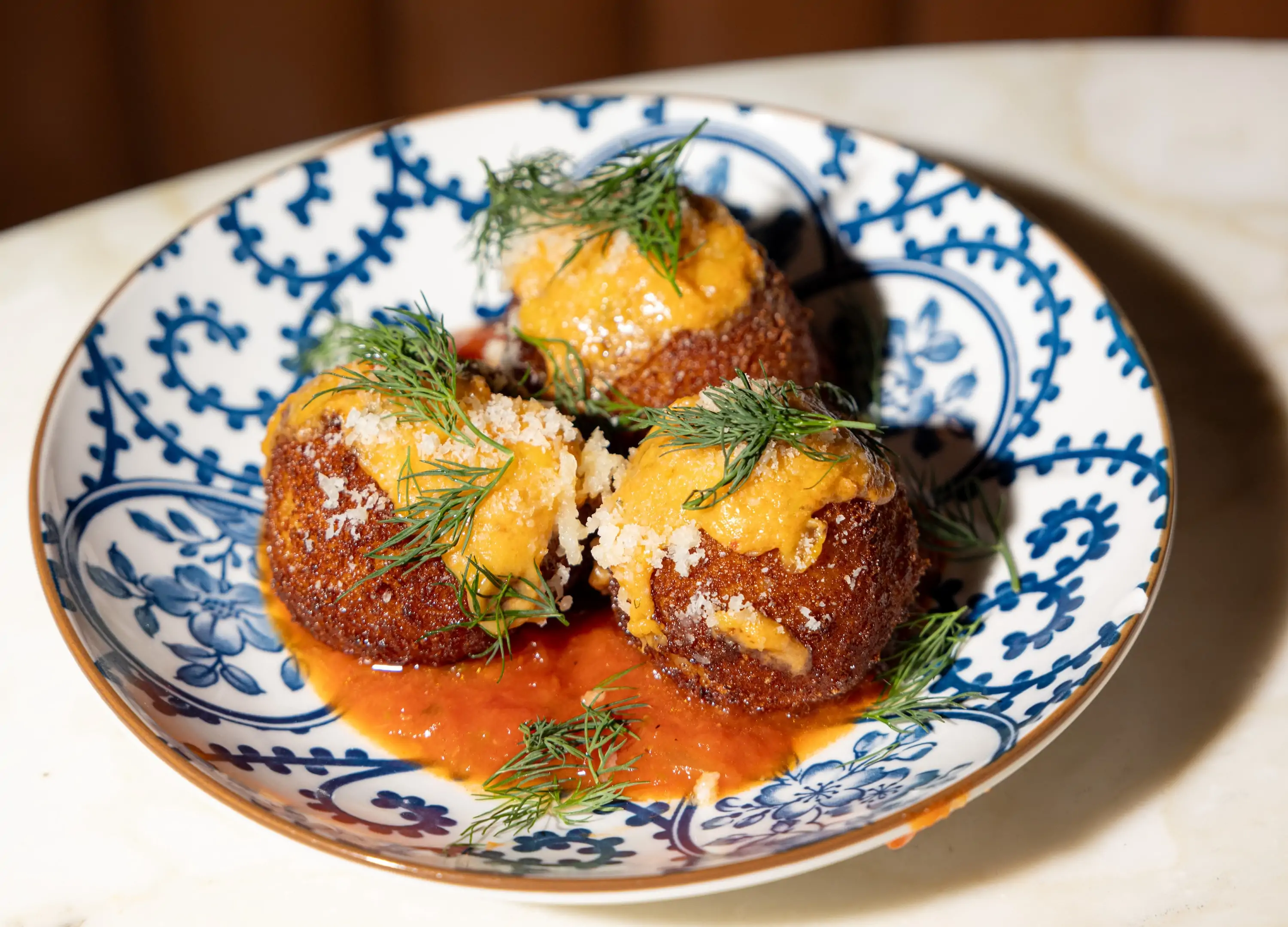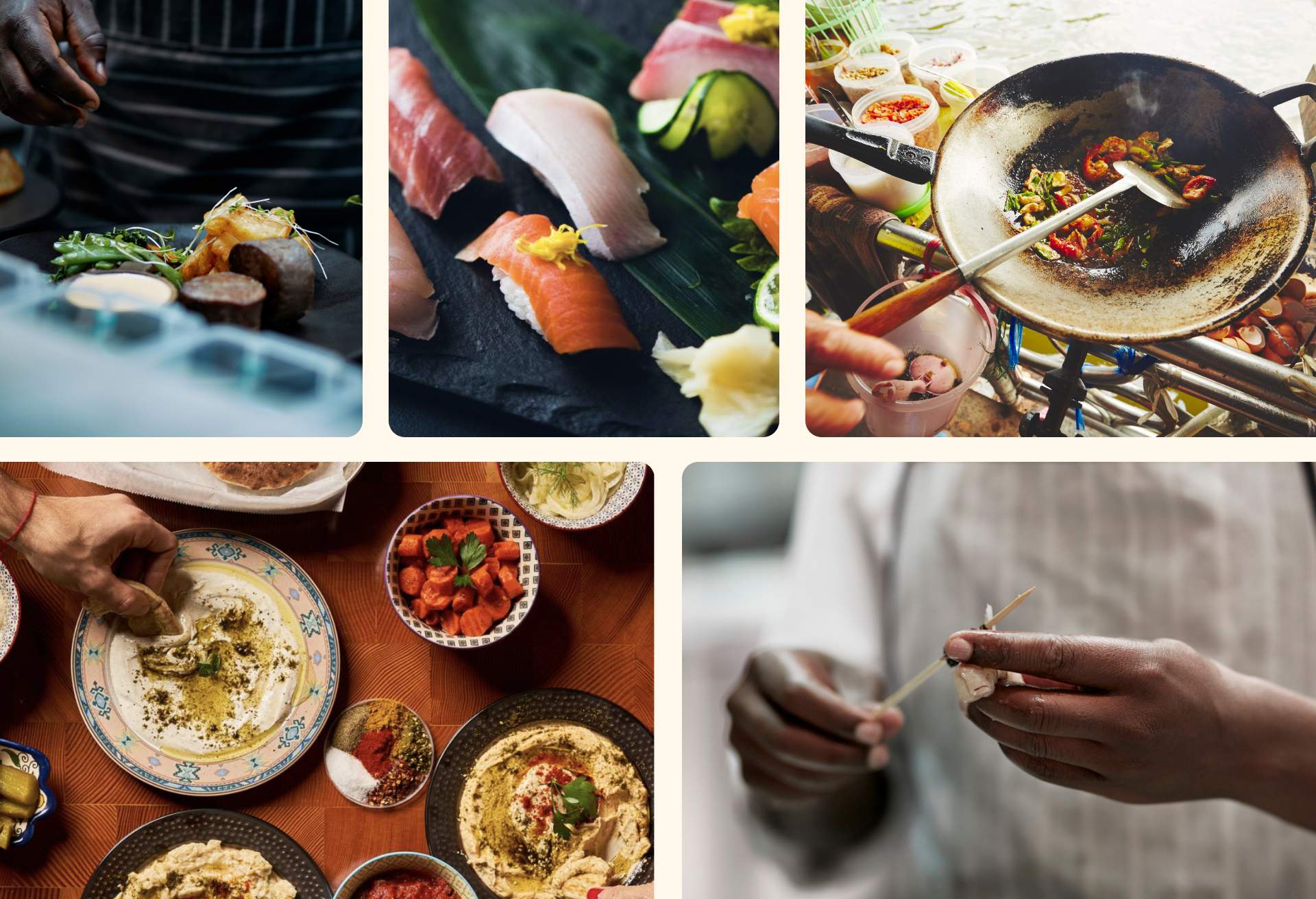There are myriad definitions of “service” for veteran chefs. While today many of them are used to the pace and demands of the kitchen to bring the best to diners’ tables, their resilience, passion, and exposure to global cuisines were honed serving in the military.
Whether it was a sense of fulfilling a family legacy, the opportunity to attend a prestigious culinary school thanks to the G.I. Bill, or a sense of patriotism, these soldiers’ and sailors’ worldwide travels have instilled a sense of pride, duty, and honor behind the stove that’s worth saluting this Veterans Day. Read on for the stories of three chefs who served in the Army, Navy, and Air Force.
Lance McWhorter, Culture ETX, Tyler, Texas
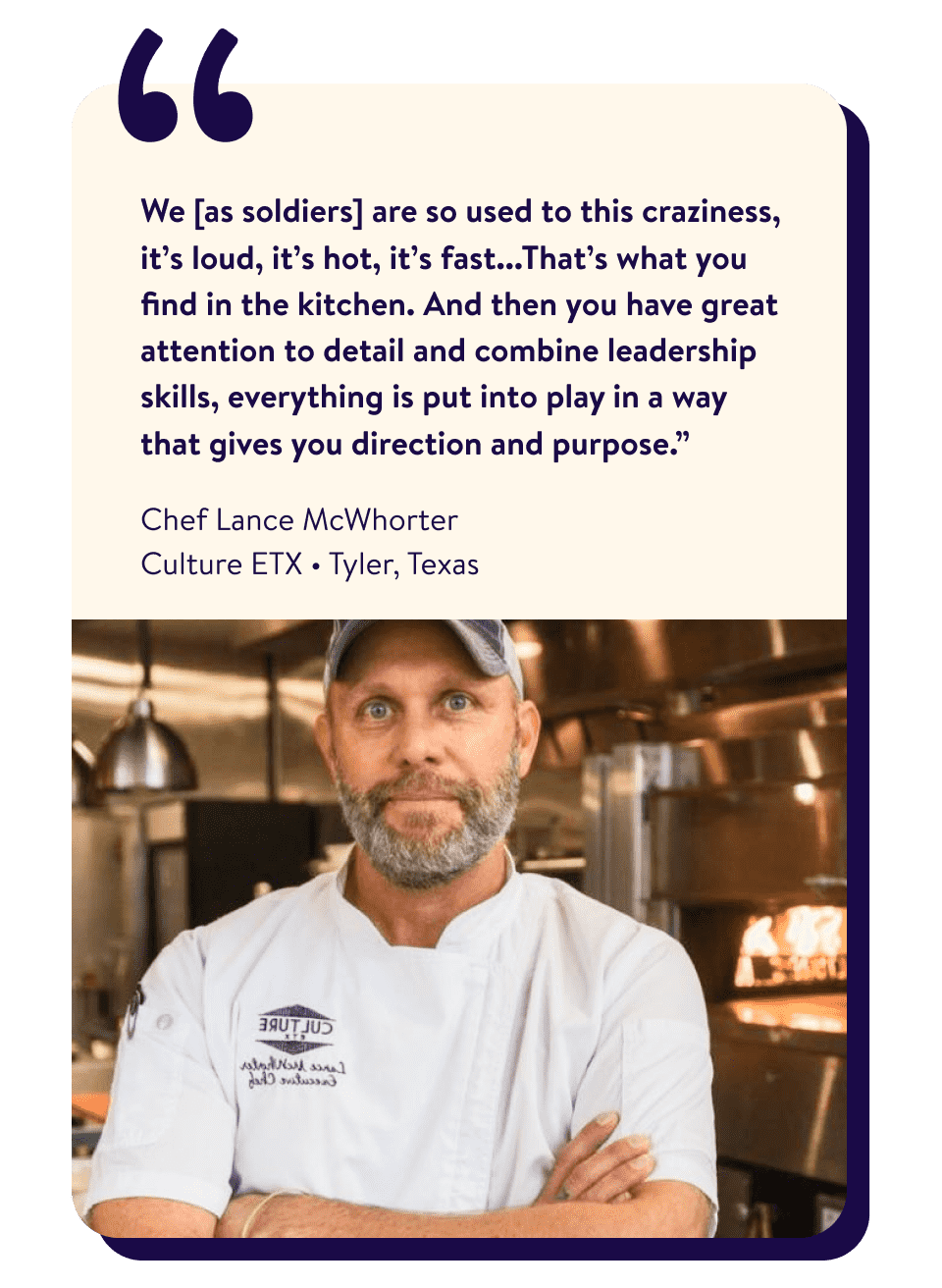
Chef Lance McWhorter says that when the location for Culture ETX opened up in downtown Tyler, Texas, it was kismet. Not only was he looking for a restaurant space at the time, but the prime corner spot is a metaphor for his concept: a place where flavors and cultures meet and harmonize at a crossroads.
Culture ETX pulls from his travels to more than 40 countries during his time in the Army and Navy. Those include Australia, China, and India, as well as swaths of the Middle East and Eastern Africa. “This is the kind of place where you can go if you can’t decide what you want or if everybody can’t agree on what they want,” McWhorter says of his menu.
But don’t call his food fusion. McWhorter dislikes the term and feels it disrespects the cultures he’s trying to celebrate at the restaurant. Through his menu, he wants to recreate the feeling he had breaking bread with families across the world who welcomed him as a soldier and sailor.
“Food really brings people together,” McWhorter says. “You can literally sit around the table with people and not be able to understand what they’re saying, but you get it, and it’s really easy to get passionate about that.” The chef describes Culture ETX’s menu as how his grandmother would cook Texas favorites if she had to incorporate harissa paste or curry powder.
McWhorter was inspired to take up a career in kitchens after an extended stint in the Middle East and after many readings of the late Anthony Bourdain’s Kitchen Confidential. Being a chef saved his life by redirecting his energies after time in Iraq, McWhorter says. “We [as soldiers] are so used to this craziness; it’s loud, it’s hot, it’s fast,” he says. “That’s what you find in the kitchen. And then you have great attention to detail and combine leadership skills, and everything is put into play in a way that gives you direction and purpose.”
McWhorter advocates for more veterans working in kitchens, and has appeared on the Food Network series Chopped to talk about its benefits as a post-service career. A hands-on career suits a lot of veterans’ physical and emotional needs, he says. “What better way to get that out than an audience of 12 million people?”
At his intimate East Texas restaurant, most tables have a view of him working in the kitchen. There’s Wu-Tang playing in the background and tablecloth-free tables in the dining room as McWhorter composes stunning plates of food. “It’s edgy and worldly,” he says. “This isn’t your East Texas chain restaurant.”
Erick Vargas Bromberg, Charlie Palmer Steak NYC, New York City, New York
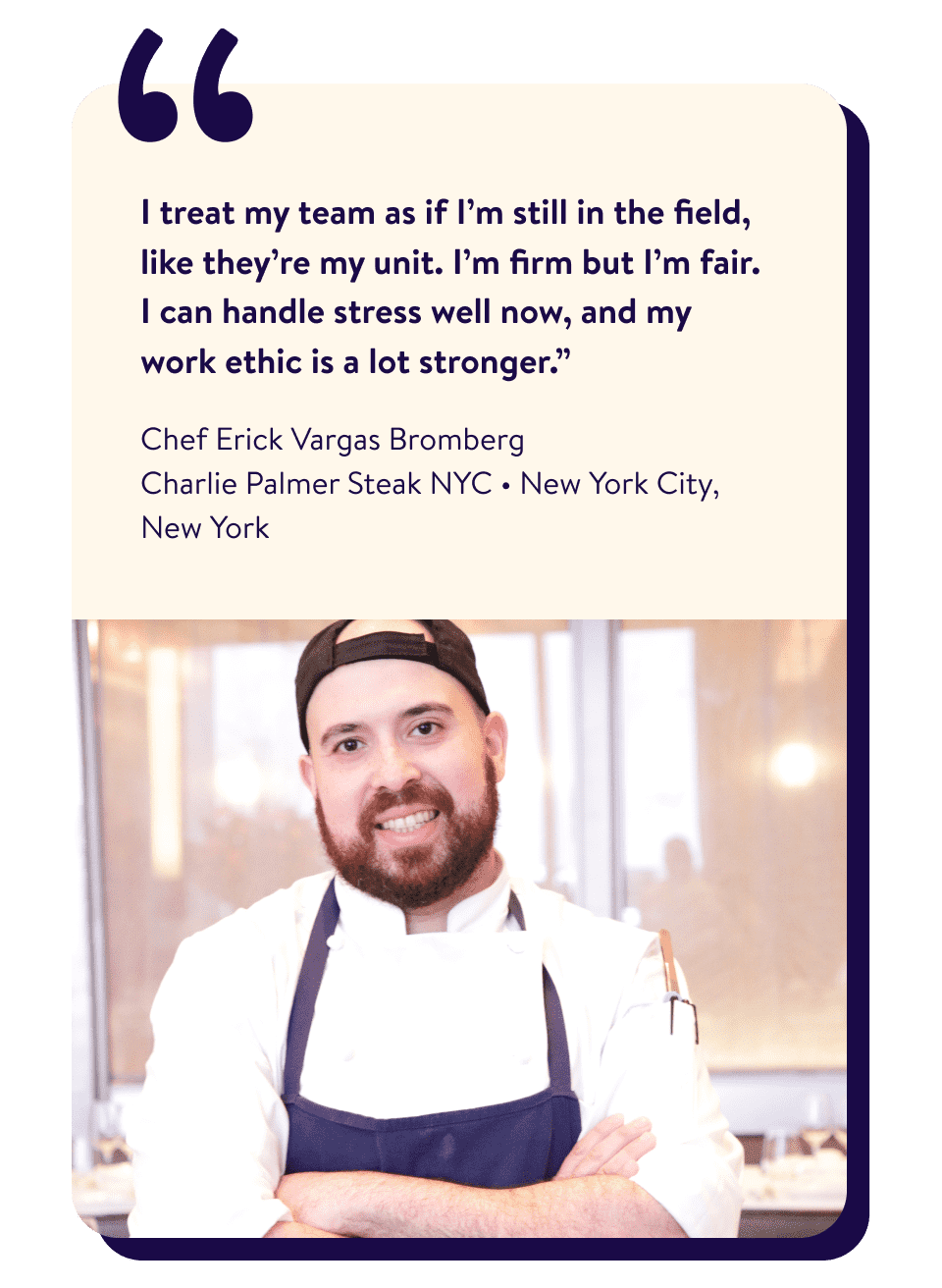
After six years in the Army, Erick Vargas Bromberg was ready to trade his Special Forces Green Beret for a chef’s toque. But as the executive chef at Charlie Palmer Steak NYC, many of the lessons he learned in the Army still resonate.
“I treat my team as if I’m still in the field, like they’re my unit,” Vargas Bromberg says. “There are some leadership skills that I avoid—we had a lot of entitled officers, and I didn’t want to be that type of leader. I’m firm but I’m fair. I can handle stress well now, and my work ethic is a lot stronger.” That’s a work ethic that extends to Vargas Bromberg steadfastly visiting the gym as well.
Vargas Bromberg’s military service had a dual purpose: defending himself since he was picked on as a kid, and honing those leadership skills that now serve him well in the kitchen.
He learned from the best at an early age. At 13, Vargas Bromberg started working as a dishwasher at acclaimed Nordic restaurant Aquavit, then under celebrity chef Marcus Samuelsson. He spent his formative years in restaurant kitchens before enlisting in the service.
While most of Vargas Bromberg’s tenure was spent stationed at Fort Bragg in North Carolina— surrounded by burger joints and casual chain restaurants—the young soldier often dreamt about cooking foods from different cuisines.
This was in large part due to his exposure to various cultures and languages during his time abroad in the service. One of the dishes that can often be found on his own kitchen table is Seoul-style braised brisket with farina dumplings inspired both by his heritage and his travels. The dumplings, made of farina, are a recipe that comes from his mother, a Russian immigrant. The chef finishes off his brisket dish with a drizzle of a sweet Korean glaze.
Vargas Bromberg says his time in the Army proved particularly valuable in quickly switching gears during the pandemic. When restaurants shut down, Vargas Bromberg served as a volunteer chef for researchers at Johns Hopkins University. In times of uncertainty, doing good helps you stay proactive and remain resilient, he says.
Chef Henry Johnson, Bistro 31, Dallas, Texas
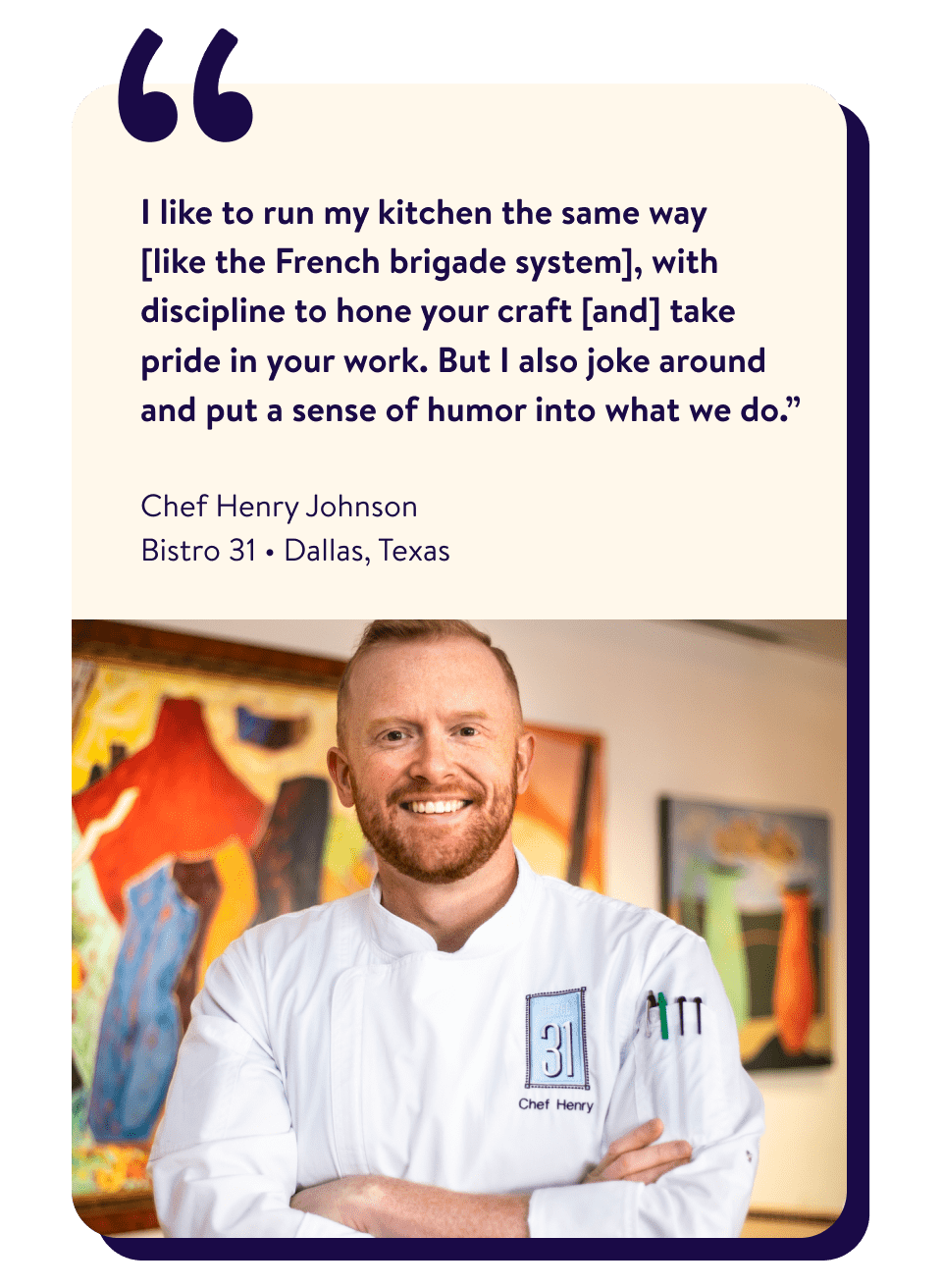
Henry Johnson, the executive chef at Dallas’s Bistro 31, loves working for a family business. His restaurant (and several others across Texas) are owned and run by Alberto Lombardi and his children. It ties in naturally with his decision to join the Air Force, following in the footsteps of his grandfather and father.
His love for kitchens, meanwhile, is another family affair. Before he had any interest in being a soldier or a sailor, Johnson spent as much time as he could slicing and dicing in the kitchen with his grandmother. After just one semester in college studying jazz saxophone, Johnson was ready to trade in the instrument for apron strings. Enter the Air Force and the G.I. Bill that would cover the expenses for a degree from the prestigious Culinary Institute of America.
Johnson’s six years in the Air Force included a year stationed at Osan Air Base in South Korea. “Whether it’s Korean, Italian, French, they have so many types of cuisine,” Johnson says of his time in South Korea, which he described as the food capital of the world. “South Korea is such a melting pot.” One of his most memorable experiences in the country was at an Italian restaurant called Heavenly Bread, whose pastas Johnson calls “phenomenal.”
“I really love making pastas,” he says. “It’s one of my favorite things to do. It’s very tactical, with your hands in the dough.”
Today, at Bistro 31, the upscale setting is far from any base mess hall Johnson spent time in while in the Air Force. Diners are surrounded by Venetian Murano glass chandeliers, white oak hardwood, and cushy seats. The idea is to transport people to a modern French Riviera bistro, and Johnson’s menu is peppered with dishes inspired by the French, Italian, and Spanish cuisine he sampled overseas. These include lobster ravioli tinged with lemongrass and tarragon, and black truffle gnocchi with morel mushrooms and smoked pancetta.
In the kitchen, the discipline and work ethic is no different than the military, Johnson says. He models his kitchen on the brigade system created by legendary French chef Auguste Escoffier, who was also inspired by his time in the service. “I like to run my kitchen the same way, with discipline to hone your craft, take pride in your work,” Johnson says. “But I also joke around and put a sense of humor into what we do.”
Carley Thornell-Wade is a Boston-based food, travel, and technology writer who’s been to more than 70 countries and delighted in tasting the regional delicacies of each.

